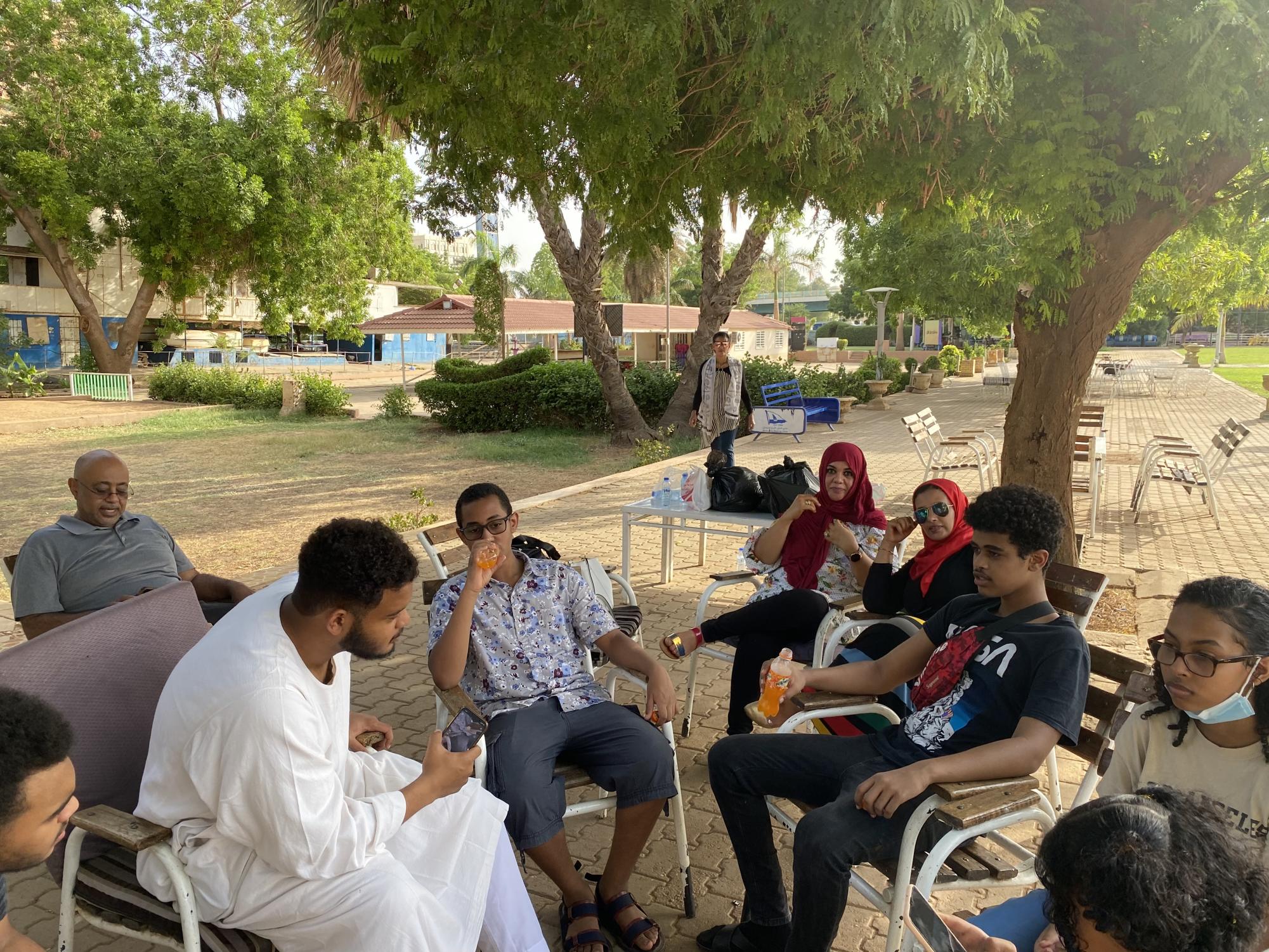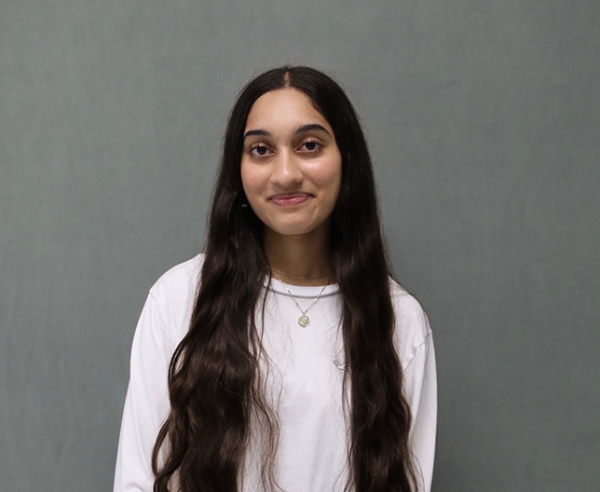For senior Afnan Gabir, this summer was the one to look forward to, as she was finally going back to Sudan, her beloved home country. But in place of Gabir on her childhood bed, there was a middle-aged bulky man with the letters “RSF” embroidered onto his camouflage suit; instead of welcoming gifts for her family, her house’s closets were filled with rifles; instead of playing with her friends on the scorching streets, she heard stories of their fathers being stabbed in the chest nine times. Her Sudanese summer dream had turned into a bloody nightmare.
Gabir moved from Khartoum, Sudan in 2019, when the people of Sudan overthrew the government and the country fell into revolution. In mid-April, the instability erupted: The two military groups, the Rapid Support Forces (RSF) and Sudanese Armed Forces (SAF) began firing in Khartoum and have been fighting for power ever since.
“They fought over control,” Gabir said. “Civilians were caught in the crossfire.”
The war broke out during the last 10 days of Ramadan, a special month in the Islamic calendar devoted to fasting, prayer and reflection. The last 10 days are considered to be among the holiest days of the year, but contrary to the typical tranquility of Ramadan, families in Sudan broke their fast through the unsettling sound of bombs and explosions.
“They couldn’t enjoy Ramadan. They couldn’t go out to pray,” Gabir said. “On the first day of Eid, everyone in Khartoum was trapped in their houses, fearing for their lives, praying that they [would] survive this.”
People were stuck inside their houses for days without electricity, unable to restock their food or water in fear of being shot. Gabir’s many cousins in Sudan would contact her whenever possible and describe the situation, as there was little to no media coverage of the war during this time.
“They were even afraid to get up to use the bathroom because of the ricochets of the bullets,” Gabir said.
Gabir’s father, who still lived in Sudan for his business, would periodically come and stay with his family in Austin. By a miracle, he left on the last flight from Sudan on April 14, hours before the war had commenced. While he was safe from the war, Gabir’s family received an alarming call from their housekeeper. The RSF had broken into their home.
“It’s my childhood home,” Gabir said. “And it’s so strange; strangers are sleeping on my bed, they’re using my stuff, they’re [wearing] our clothes, they’re looking at our pictures. We don’t even know if the house is destroyed or not. We don’t know anything.”
There were countless stories of the RSF invading homes and hospitals, looting property and assaulting residents, but after Gabir received the devastating news that the forces had broken into her childhood house, it put the situation in a new perspective.
“I was born there. I lived there for 13 years,” Gabir said. “My dad lived there when he was a child. It’s just such a big part of who I am. That made me the most upset, that I might never get my childhood home back.”
On top of the grief regarding possibly losing the place she calls home, Gabir was preoccupied with the stress of her friends’ and family’s safety. A group of her cousins lived in a severely compromised part of Khartoum. Due to its proximity to several military bases, it was almost infeasible to try to escape. In Ramadan, during the time of Adhan (the call to prayer) when all of Khartoum would break their fast, the city would slightly calm down, providing relative peace for approximately 30 minutes. One day, the military forces announced that they would stop firing during Maghrib (the fourth prayer) time. Gabir’s cousins took this as their chance to flee.
“They didn’t take anything,” Gabir said. “They just took the car and they left. Not knowing if they would even survive, the only thing they had was faith in God.”
Thankfully, Gabir’s family was able to cross the border to Egypt and from there, some fled to Qatar and U.A.E where they had various contacts. For many Sudanese citizens, however, Sudan is the only place they’ve ever known and without connections in another country, getting out is a much more complicated affair. In addition, after crossing the border – if they’re able to – their next struggle is finding sufficient relief, as many countries tend to take advantage of or even flat-out reject the refugees.
“Sudan is considered to be Afro-Arab,” Gabir said. “They’re not considered black enough to be Africans, but they’re also not Arab enough to be Arab. So there’s kind of that factor where they don’t really belong anywhere; they can’t find adequate support.”
Gabir and many other Sudanese people have always felt that largely because of their ethnicity not falling into one precise category, their country is “irrelevant” to the rest of the world. In addition to other countries not showing much interest in helping Sudan, the government has been very closed off media-wise, and therefore many aren’t even aware of the war. It has been very frustrating for Sudanese people to not be able to do anything beyond social awareness and prayers to help their country, as the RSF is stealing any aid that arrives in Sudan.
“I was sad, I was angry, but something that people might not know is that I felt extremely guilty,” Gabir said. “Why am I lucky enough to be here while all my family and friends are getting killed? Why am I lucky to be safe, to go to school and have fun? I felt so guilty about being happy and enjoying the fruits of living in a safe country.”
While dealing with both school stress and the rollercoaster of emotions that the Sudanese war had provided Gabir with, she found the most comfort in Islam.
“We were at the mosque, staying up all night in prayer,” Gabir said. “And at that moment, it was like a weight was lifted off [of] my shoulders because I let go of all my feelings, all my fears, all my anger, all my guilt, and I just cried, and cried and cried to my Lord. Over time, all this anger, this sadness, this guilt – it transformed into hope.”
Through sticking by her faith, endless praying, and considerate support from her friends and teachers, Gabir transitioned into a more positive mindset. She decided to reshape her guilt into gratefulness, making sure to take advantage of all the opportunities she gets by living in a developed country.
“I have to do good in school and be the best version of myself so I can hopefully get into a good medical school, become a doctor and go back and rebuild,” Gabir said. “If we, the young Sudanese generation, don’t rebuild the country, then it’s lost forever. I’ve never been more determined to become a doctor and succeed. That’s why every time I was stressed out about schoolwork, I just pushed through because I had a bigger goal in mind.”





Dana • Oct 2, 2023 at 9:11 pm
Thank you so much Afnan for sharing your story and spreading awareness. Great job with the article Aisha!
Rawan • Sep 8, 2023 at 8:04 am
Thank you Afnan. Im very glad and happy that you tried expressing this message and tried to spread the word of what is happening in sudan ?? we need more media coverage more campaigns and so much more to try to help our friends and family that are still stuck in the middle of two people fighting over power .i feel so remorse although i was one of the survivors that remarkably and luckily left sudan .
RAWAN AHMED WAGIALLA